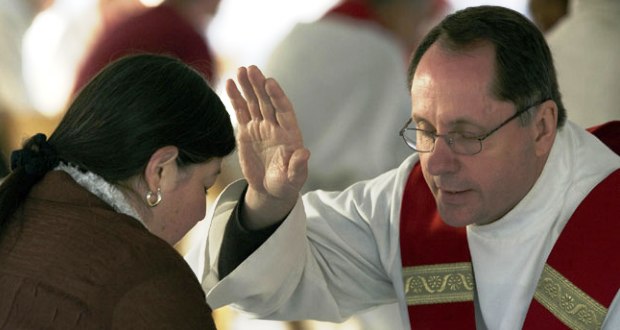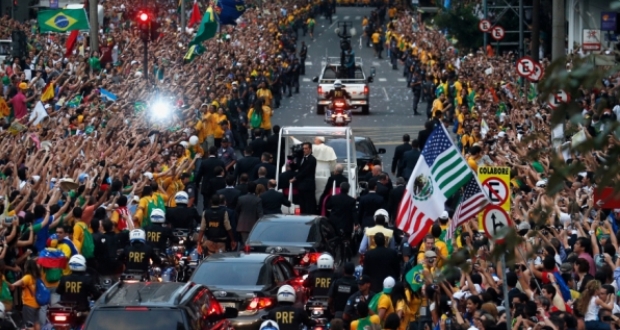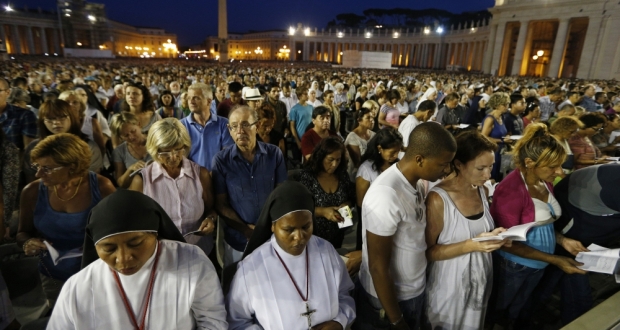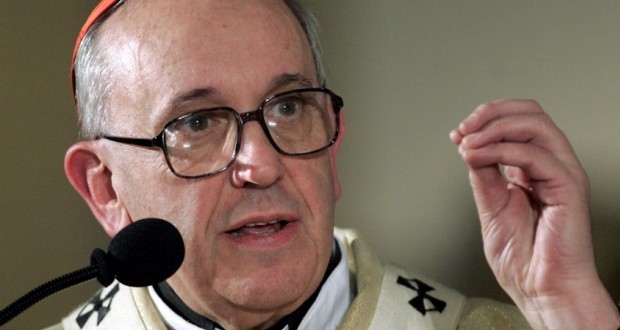Pope Francis to Priests – Keep In Touch With Your People

Yesterday in the Basilica of St. John Lateran, Pope Francis met the clergy of the diocese of Rome, of which he is the bishop. In a relaxed and cordial atmosphere, the Holy Father invited the priests to do not hesitate to ask any question they picked, confirming that he considered himself above all to be a priest, and now as Pope he was afraid of feeling otherwise. “I would be weary of feeling a bit more important; I am afraid of that, because the devil is cunning … and makes you think you have power, that you can do this and that … But thanks to God, I have not yet lost that concern, and if once you see that I have lost it, please, inform me, and if you cannot inform me independently, say it publicly, however state it: ‘Look, convert!’ It’s clear, isn’t it?”.
Francis also spoke about the weariness priests experience owing to the hard work they do. “There is the exhaustion arising from work, which all of us know; we arrive home at night, tired after our work and we invest a moment prior to the Tabernacle to greet the Lord, which we should always do … When a priest is in contact with his people, he works, but he sleeps well. When a priest is not in contact with his people, he works, but he works badly and rests badly. … When a priest is in contact with his people, who have lots of genuine demands, require for God, then this needs serious effort”.
Nonetheless, he continued, “there is a last effort, which is required at the moment that there must be accomplishment. … This occurs when a priest questions himself about his presence, he looks within himself at the course he has followed, at the sacrifices he has made, the children he has not had and asks if perhaps he made a mistake, if his life was a failure”. The Pope mentioned the terrific effort made my many figures in the Bible, by Elijah and Moses, by Jeremiah and John the Baptist. The latter, he remarked, “in the darkness of his confinement experienced the darkness of his soul, and sent his disciples to ask Jesus if it was He Who awaited him. So, what can a priest do when he lives the experience of John the Baptist? Pray, to the point of sleeping prior to the Tabernacle, however stay there”. He included that they must “seek the affinity of other priests and, most significantly, bishops”.
In response to a concern on pastoral service, Francis reiterated that one must not “confuse creativity with making something brand-new. Imagination is finding the path to announce the Gospel and … this is difficult. It is not simply a concern of changing things. It is something different, it comes from the spirit and goes through prayer and discussion with people, with the faithful”. The Pope remembered an experience he had as archbishop of Buenos Aires, when a priest was looking for a method of making his church more welcoming: “Ah, if many people pass in this manner, possibly it would be good if the church were open all day … Good concept! And it would likewise be good if there were constantly a confessor available there. … Good idea! And so it went on”.
This, he clarified, is “courageous creativity”, and it is needed to “find brand-new courses”. The Church, “as well as the Code of Canon Law”, he added, “offer us lots of, numerous possibilities, so much freedom to look for these things. … We must discover those minutes to welcome and get the faithful, when they get in the parish church for one reason or an additional”. He badly criticised those who were more worried about asking for money for a certificate than with the Sacrament and therefore “keep people away”. Instead, there need to be a “cordial welcome” so that those “who go to Church feel comfortable. They feel comfortable and do not feel as if they are being made use of. … When people feel there are economic interests at work, they stay away”.
Francis recommended to the priests of Rome the figure of the “missionary priest”. A priest ought to always remember his first love, for Jesus. “For me”, he stated, “this is the bottom line: that a priest has the ability to return in memory to his first love. … A Church that loses her memory is an electronic Church, without life”. He suggested the priests of his diocese to be careful of both extreme and lenient priests. “Instead, the merciful priest announces that ‘God’s reality is this, so to speak, dogmatic or moral reality’, however always accompanied by God’s love and persistence”, including “Do not panic– the excellent God awaits us. … We should constantly bear in mind the word ‘accompany’– let us be traveling companions. Conversion constantly happens on the street, not in the lab”.
The Holy Father also referred to the scandals that have beleaguered the Church, verifying that it is essential to face the most significant troubles with clarity, “but without pessimism”, since “holiness is higher than scandal”. “The Church will not break down”, he stated. “On the contrary, the Church has never ever been in much better type and is experiencing a really positive minute; one need just read her history. There are saints recognized even by non-Catholics, such as Mother Teresa of Calcutta, however there is likewise the everyday holiness of ordinary moms and women, of men who work every day for their households, and this brings us hope”.
Attention turned to the style of existential peripheries, this time referring to the situation of separated and remarried Catholics. “The trouble”, stated Francis, “can not be reduced simply to a matter of who can get communion or not, since to position the question in these terms does not allow an understanding of the real problem. … It is a serious problem concerning the Church’s responsibility to families living in this situation. … The Church needs to now do something to address the trouble of marital relationship annulment”. The Pope restated that this issue will be talked about with the group of eight cardinals who will fulfill at the beginning of October in the Vatican and it will likewise be thought about during the next Synod of Bishops which will focus on the anthropological relationship of the Gospel with the individual and the household, as “a synodal technique ought to be take to the study of this trouble”. He emphasised, “this is a real existential periphery”.
In an atmosphere of fantastic cordiality, the Pope advised the priests that on 21 September he will celebrate sixty years since his priestly ordination.






